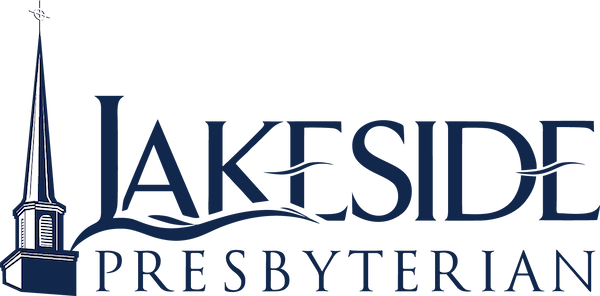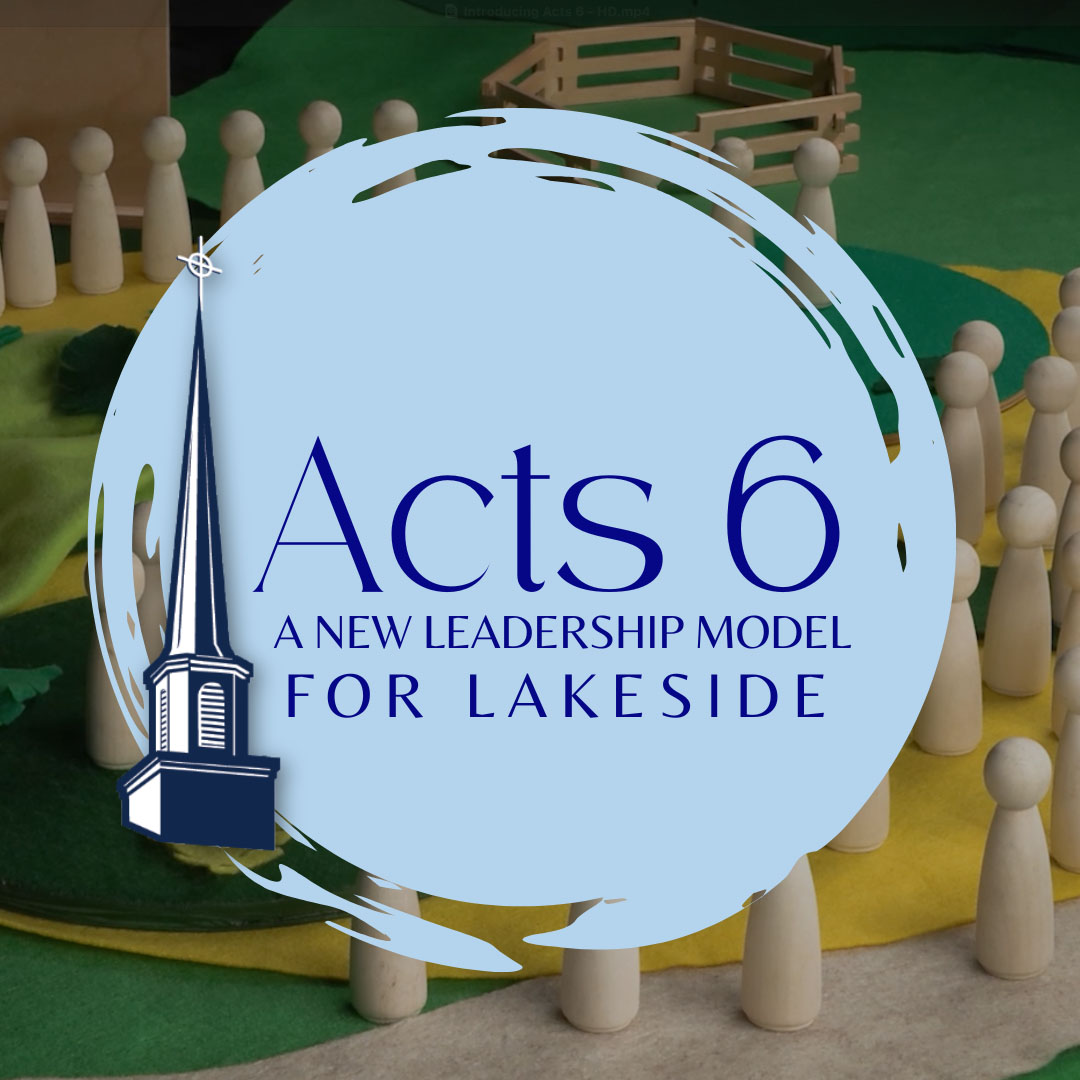The Acts 6 Model: A Bold Step Forward for Lakeside's Future!
“Therefore, friends, select from among yourselves people of good standing, full of the Spirit and of wisdom, whom we may appoint to this task.”
– Acts 6:3
Understanding Acts 6
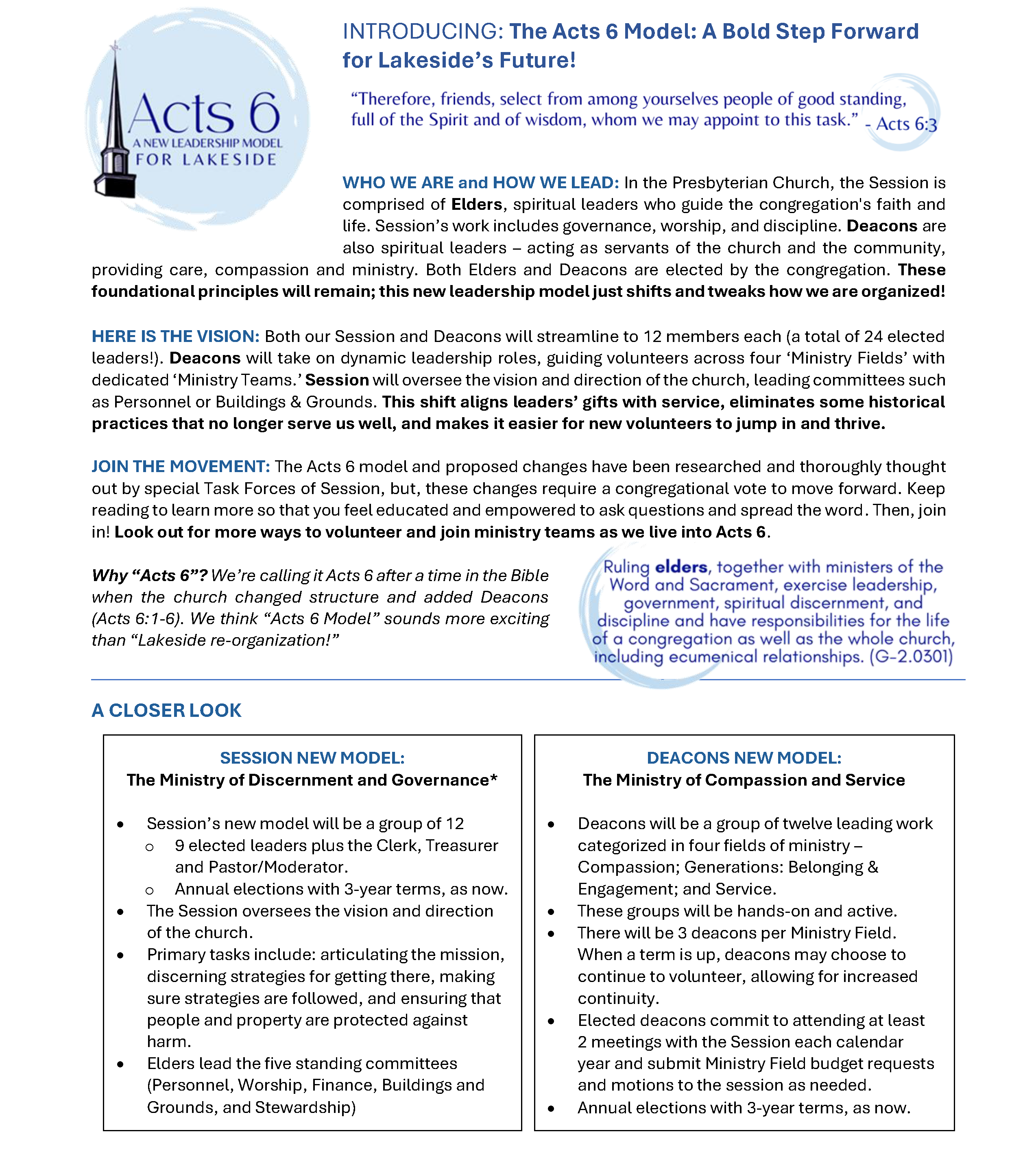
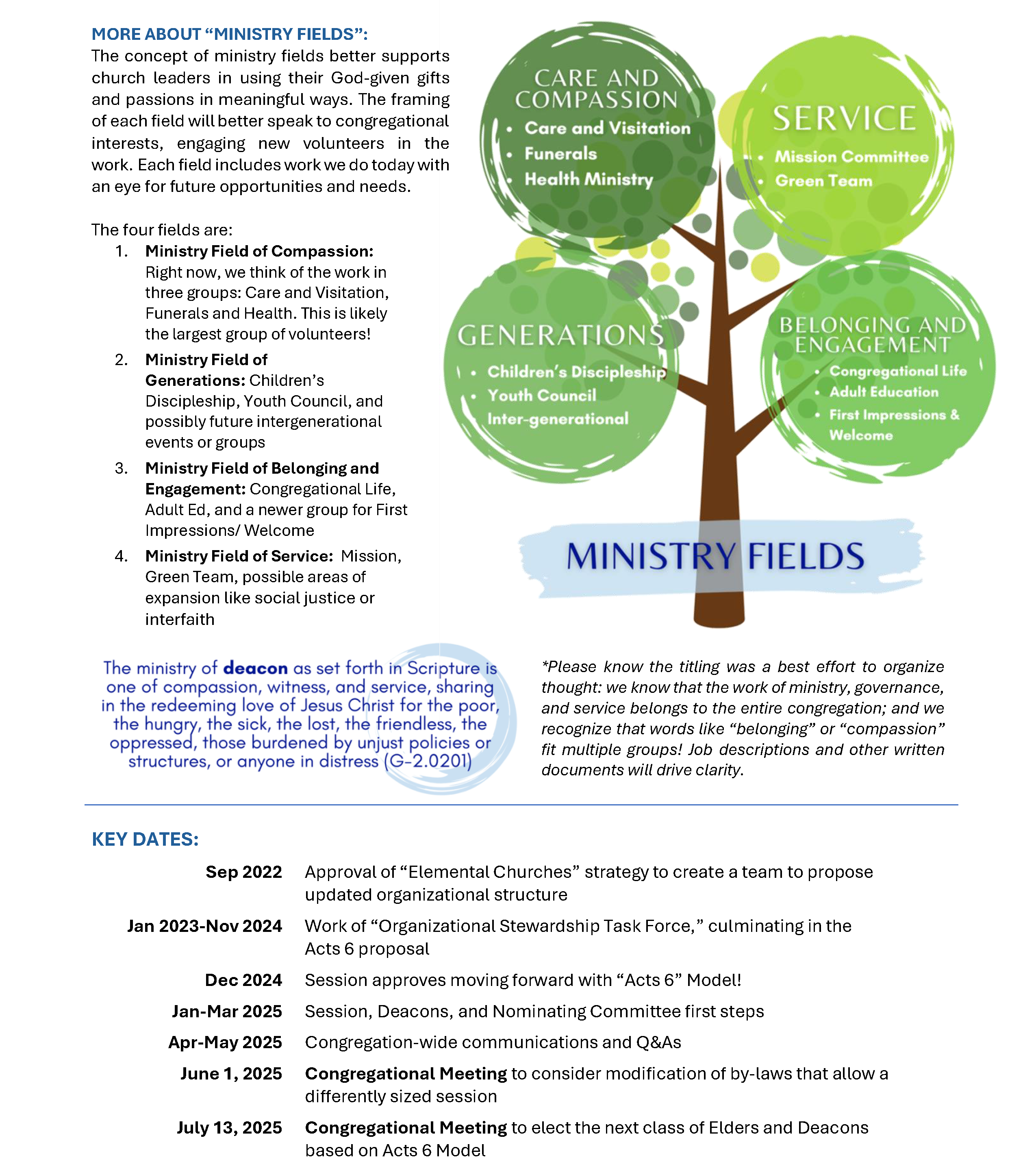
The Organizational Chart
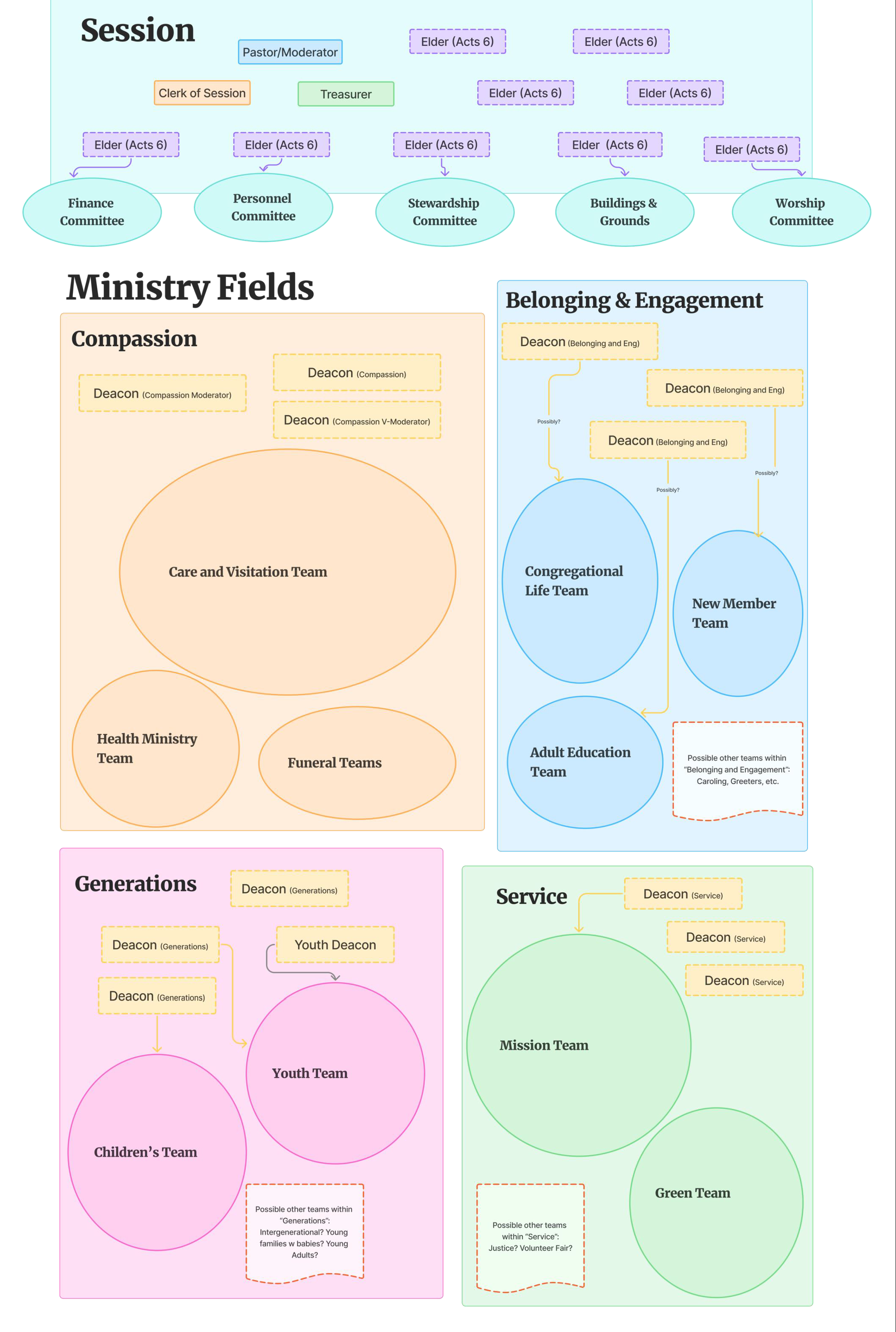
Acts 6 FAQs
WHAT IS THE ACTS 6 MODEL at LAKESIDE PRESBYTERIAN? WHY NOW?
Acts 6 tells us of a time when the Church leaders changed structure to meet needs. Like in the Book of Acts, when deacons were first called to meet the needs of widows, Lakeside Presbyterian will make a leadership change to meet current and emerging needs.
The new model for our church has been in development for quite some time.
- In 2022, we identified a strategic goal to position Lakeside Presbyterian Church to attain organizational and financial stability, allowing us to fulfill our mission. This goal included a strategy to “review our organizational structure so that we might be good stewards of volunteer time and talent.”
- In 2024 Session approved a model transforming our forms and functions to be better stewards of time and talent. Note the timing – strategy identified in 2022 and decisions in 2024. That’s a testament to the careful consideration and countless hours of effort by leaders and volunteers.
In a nutshell, the model modifies the size of Session and deploys Deacons and other volunteers into four “fields of ministry” or “ministry teams.”
“Acts 6” is a short-hand way for leaders and the congregation to describe our intentions. We wanted to use a title that reflected our commitment to Christ and “organizational restructure” sounds too corporate! We don’t intend for the term “Acts 6” to be a long-lasting term in our church communications or culture.
It is our intent to begin implementation of the new model with this nominating cycle, kicking into gear in the fall of 2025. Full implementation of the model will take additional time as we phase into the new nominating approach.
WHAT IS THE PURPOSE OF SESSION IN THIS ACTS 6 MODEL? IS THAT A CHANGE?
In the Presbyterian Church, elders are spiritual leaders who guide the congregation’s faith and life. Elders are also responsible for governance, worship, and discipline.
Session’s purpose and responsibilities do not change. Session has 5 critical standing committees: Finance; Personnel; Buildings and Grounds; Worship; and Stewardship. In addition to committees, Session has areas of focus like Long and Short-Range Strategic Vision, Membership Rolls, Church Discipline and Property (higher level decisions than those typically held in Buildings and Grounds). None of that work goes away.
WHAT IS THE PURPOSE OF DEACONS IN THIS ACTS 6 MODEL? IS THAT A CHANGE?
Deacons have always been servants of the church and the community. They provide care, compassion and service and this purpose does not change. That holy work will continue. What changes is how we organize and structure teams and meetings. We believe that many members of the church provide care and compassion, and those gifts will be better utilized in the new model.
IF THE PURPOSE DOESN’T CHANGE, WHAT DOES?
The form and function of leadership, volunteerism and service will change in this new model.
The Board of Deacons will transition into four Ministry Fields: Compassion, Belonging & Engagement, Generations, and Service.
The Session, over time, will have 9 elected ruling elders, three per year.
- 5 elders will serve/lead the 5 standing committees
- 4 elders will be available to serve/lead any governance or strategy efforts that fall outside the scope of the 5 standing committees
- The role of Clerk, Treasurer and Pastor/Moderator brings the size of Session to 12. (As now, there will not be a rule prohibiting the elected Clerk or Treasurer also serve as one of the 9 active ruling elders, but that has not happened in recent history and would not be the goal.)
Succession planning for committee and team leadership will be incorporated into the work of Session and the work of the Nominating Committee.
WHAT DO WE GAIN FROM THIS NEW MODEL?
The hope is that the new model offers heightened levels of energy and efficiencies of time for elected leaders. The shift to fields of ministry (or ministry teams) allows us to more flexibly engage volunteers in ways that ignite interests and passions tied to how God calls each of us to serve in the world. A smaller size of Session enables those leaders to cultivate deeper relationships with each other and their committees.
WHAT DOES THIS MEAN FOR OUR CURRENT ELDERS?
Remember: elders are spiritual leaders who guide the congregation’s faith and life. Elders are also responsible for governance, worship, and discipline. We honor those gifts, and the trust placed in our current elders by the congregation!
It is also the work of our congregationally elected Nominating Committee to discern gifts and bring forward names for elders and deacons. We prioritize the individual/collective gifts over forcing a form/size too quickly. Because of that, the Nominating Committee is working with currently elected elders whose committee work is directly affected by these changes to help them discern best next steps. They may choose to remain elders on session who also continue their leadership in one of the ministry fields; or, they may choose to resign as elders in order to become a deacon within that ministry field. Should they choose to become a deacon in their ministry field, the congregation will have the opportunity to affirm that call by electing them to that role in July.
Our next two years of session will see us transition slowly into the optimal size of 9. That’s okay. What’s most important is that each leader feels called and supported in decisions surrounding their role in the new model.
Over time, we intend to have 9 ruling elders with 3 elected each year. We intend for the Nominating Committee to recommend 3 new elders in 2025.
WHAT DOES THIS MEAN FOR CURRENT DEACONS?
When deacons were originally nominated to serve, they were invited into a position within Lakeside’s Board of Deacons in its current model. They accepted that call and the congregation affirmed it. That will not change.
To reaffirm this call, the Nominating Committee is communicating with all deacons that they will continue to serve as deacons within the Compassion Ministry Field. That said, once their terms are complete, we hope that they will not stop living into those gifts! Whether or not they are called to serve as an officer after their current official term ends, they will always remain eligible to serve on ministry teams for visitation, caring for their congregational care lists, hosting funerals, and more.
Over time, we intend to have 12 deacons with 4 elected each year. We intend for the Nominating Committee to recommend 4 new deacons in 2025.
WHAT RISKS WERE CONSIDERED BEFORE DECIDING THE SIZE OF SESSION IN THE PROPOSED NEW MODEL? WHAT DO WE STAND TO LOSE?
Before we talk about risk or loss, let’s remember how Presbyterians think about governance. In our system of governance, power is distributed among different groups of elected leaders, including teaching elders (pastors) and ruling elders. The system ensures that no single individual or group holds too much authority.
Decisions are made through a collaborative process at various levels (session, presbytery, synod, General Assembly), preventing abuse of power and promoting accountability across the church body. This structure is based on the belief that no one person is infallible, and that collective wisdom is best for decision-making.
Session will be designed for 12, a well-known number for leading powerful, faithful change! Sessions of the future include 9 elders plus a Clerk, Treasurer and the Pastor/Moderator. We believe that the future size of Session offers stability for governance with fluidity for leaders to live into their specific gifts and passions.
DO WE NEED A CHANGE TO THE BY-LAWS?
Yes. While our by-laws allow flexibility regarding numbers of deacons (something we opened up with by-law changes made in 2021), current by-laws state that the congregation “shall elect eighteen elders into three equal classes.” As the new model proposes fewer elders, we will need to approve changes to that language.
DO THESE CHANGES AFFECT OUR ENDOWMENT COMMITTEE?
No. Your session is not proposing any changes that affect the makeup of the Lakeside endowment committee or how it currently relates to the session.
WHEN DOES NOMINATING COMMITTEE WORK REALLY START?
The nominating committee is already hard at work! Right now, they are working with current officers to help discern where they will be called in their next year/s of leadership. Once all currently elected leaders have found a proposed home for next year, the nominating committee will have clarity on how best to prayerfully recruit new Elders and Deacons for the 2025-2028 cycle. They will then be able to bring that full slate – both a new class of elders and deacons and proposed shifts of current elders – to our congregational meeting July 13th.
ARE WE DOING THIS BECAUSE LAKESIDE IS SMALLER THAN IT USED TO BE?
While we have taken changing demographics into consideration, the primary motivations were to create the best sized session for what we need. We are moving away from a model where session becomes the clearinghouse for most communication and having a representative from every committee or group is essential and toward a model where those communications are achieved elsewhere and the session can focus on other things. 21 is a great number of members for bringing lots of information to the table; 12 is a great number for lively conversation and discernment.
WHY DOES THE ‘GENERATIONS’ MINISTRY FIELD ONLY LIST CHILDREN AND YOUTH?
We hope that this can expand! One named goal for Lakeside is intentional inter-generational programming – this Ministry Field would help us focus on that. This may also be the right ministry field to house Elderberries or other generationally-specific groups and activities. That said, there is no perfect way to categorise the many ministries Lakeside undertakes. We hope that the Generations ministry field can acknowledge the ways some ages and stages require particular care and programing without oversimplifying the diversity of life-stages, family formations, and abilities at Lakeside.
ARE WE MOVING ELDERS TO THE ROLE OF DEACON WITHOUT A CONGREGATIONAL VOTE?
No. While some elders are being invited by the nominating committee to consider shifting their role to that of a deacon, any such move will not be complete without congregational approval. The elders who have been invited and feel called to adopt the new deacon role will be brought by the nominating committee as part of the larger slate to the July 13th Congregational meeting.
WHY DO WE NEED TWO CONGREGATIONAL MEETINGS?
We hope that having two meetings allows the congregation the chance to fully understand and sanction the Acts 6
Model before the nominating committee is tasked with finding the right leaders. At the June 1st meeting, the congregation can vote on by-laws that change our session size. From June 1 – July 13, the nominating committee can then discern and recruit so that our second congregational meeting can approve the new slate of elders and deacons.
WILL THIS SOLVE EVERY PROBLEM I CAN THINK OF?
Nope. There is never one perfect organizational model. No doubt we’ll be surprised by new pickles as we go! But we hope that it creates more opportunities than challenges and that we can join together through seasons of change.
WHAT ARE WE MOST EXCITED ABOUT?
This new model ignites passions and reduces the possibility of volunteer burn-out. We believe the structure provides the right level of stability and flexibility at all levels of leadership. We are grateful to the Task Force volunteers who carefully developed the model and the Session leaders who voted for implementation. We hope the congregation will join our enthusiasm!
Reorganization Timeline
2020
Vision Casting
Leadership team envisions a new model to enhance community engagement.
2021
Strategic Planning
Development of a comprehensive plan for leadership restructuring.
2022
Pilot Program
Initial implementation of Acts 6 model in select ministries.
2023
Full Integration
Acts 6 model fully adopted across all church activities and programs.
LAKESIDE ORGANIZATIONAL RE-STRUCTURE
Statement of Rationale
Brought by Organizational Stewardship Task Force and Approved by Session April 17, 2024
Christ is our sure foundation… and the Spirit moves and changes us. We are Reformed… and ever being reformed. At Lakeside Presbyterian Church, we value stability and consistency of message and purpose; we also know that change can reinforce our ability to respond to God’s call to offer a place of comfort, acceptance, and peace in an otherwise hectic and unpredictable world.
We are now at a point in time where we believe change is needed.
Our 2022 Elemental vision and strategy process identified the following goal: to “position Lakeside Presbyterian Church to attain organizational and financial stability, allowing us to fulfill our mission,” including a strategy to review our organizational structure so that we might be good stewards of volunteer time and talent. Since the last organizational restructuring in 2005, LPC membership has changed from 688 active members to 337 active members in 2024. Meanwhile, culture has significantly changed the ways we volunteer, a trend that may hinder leadership from some demographics of our membership while disproportionately favoring others and preventing equitable representation.
We hope to be a place of “bread for the journey,” not volunteer burnout.
We are called to be servant leaders, not seat fillers.
We are called to discern priorities and name gifts, not “do more with less.”
In response, we believe we need to change the organizational structure of our church, in terms of both size and spirit. We must acknowledge that membership time available to serve the church is more limited than in the past. And we must acknowledge that the energy of those called to serve, especially in ordained roles, is as important as any modifications we propose to our organizational structure. We need enough stability to maintain a coherent and cohesive vision and enough fluidity to live into the specific gifts and passions of individuals and seasons
In short, we believe we must be more effective and efficient in how we utilize our members’ offering of their time and talents. We believe this change is necessary to sustain our church for the decades to come. Our proposal for change will be aligned with this objective and guided by the Spirit.
Get in Touch With Us
Address
2690 Dixie Highway, Lakeside Park Ky 41017
Phone
(859) 341-1963
